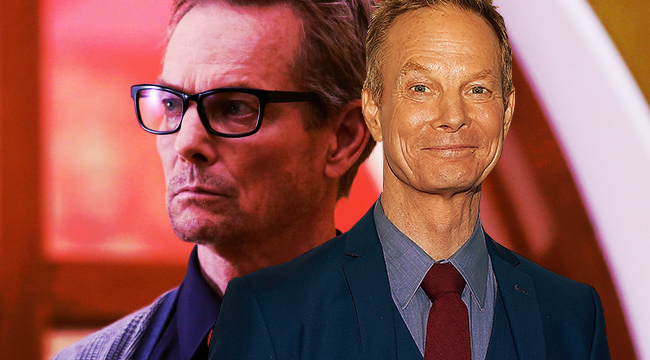
Bill Irwin has an intimidating resumé: As America’s premiere clown and mime, not to mention an actor with a mantel full of awards, he’s been packing houses with both his own work and in the plays of others for decades. His TV work, however, is no less varied or less fascinating: Kids love him as Mr. Noodle on Sesame Street, he offered a chilling turn as serial killer Nate Haskell on CSI, and right now plays Cary Loudermilk, the unlikely scientist and mutant with a strong relationship with Kerry (Amber Midthunder), the woman who lives inside him on Legion. Irwin took a few minutes with us to discuss episode four’s climax, and the physical work of being home to two people.
This episode features you essentially mirroring what happens in a fight scene elsewhere. Can you walk us through the process of how that came together?
We tried to be meticulous in our planning. This show especially is wild and you’re reacting to different ideas, because that’s who it works in Noah Hawley-land. We had in mind though my character is too old and icky to go out in battle, but he’s experiencing it all back in his lab. Little did we understand Noah had in mind this bit of story colliding with two other stories at the same time. So Cary is in my lab, thinking, worrying about my other part. She’s so eager to go out and do battle, like all young people. I wish the director and I had realized there was an opportunity to get my reaction to her being sent out. As the older part of the equation, I must, I should, have been horrified!
Is stage combat and martial arts a new area for you? Did you find you had relatable skills from your clowning and mime work?
I kept pulling out anything from the bag of tricks and thinking “Would this apply?” Because we were simultaneously watching the best stunt people I’ve ever worked with on this meticulous fight choreography. There was a little bit of clown shtick, a little martial arts, a little breakdance vocabulary. They said “Yeah, do that!” Then it went into the editor’s hands, and it was a wild dream-like mix in the end.
How closely do you work with Amber Midthunder on the physical aspects of your scenes together? You seem to reflect each other physically.
We’ve been trying to reflect each other from day one, hanging out in the makeup trailer and trading ideas. We’ve got 45 years difference in age, and it makes for a translation process! We were fascinated by the idea that they share the same body space. And as she gets older, and only ages when she’s outside my body, there’s more reason to separate, and more desire to separate. We were just always looking for ways to reflect the fact, that at some deep mythic root, Hawley created two characters who share the same root, one a tough young fighter, the other an older geeky male.
How’d you first get involved?
I got a word via my representative that Noah Hawley wanted to have breakfast with me. He didn’t mention Marvel or the X-Men narrative or the comic genre. He said “Can you imagine this story? These people are going to have their first baby, they think it’ll be a girl, but instead they have a scrawny white boy? What would happen to that family?”
So you came in with a whole backstory?
Amber had a monologue and we shopped that, and I think that Noah felt that didn’t tell the story. We were working on a future episode, and he said he wanted to shoot some other things. That’s when we got this richer, wilder story of seeing somebody playing with a train set one morning, and where we got the idea of brushing our teeth together. It was layered in there like a mosaic.
You mentioned Kerry has more desire to separate, while Cary has an older brother/father relationship. How will that reflect on them going forward?
I think I’m probably only allowed this latitude that it gets more complicated. The pressure of war, which is what’s going on in the story, that always puts terrific strain on family, and that’s true of Kerry and Cary as the episodes go forward.
You mentioned Marvel didn’t really come up. Did you do any research on the comics?
I didn’t do a whole lot of comic research, but what little I did tapped into my memory as a kid. I grew up during the golden comics age, and I remembered kind of viscerally the way the frame of a comic, a bit of artwork, there’s a way in which it’s like a frozen snapshot of extreme action. Then it jumps forward to something else. So in some ways, it’s not the most natural form for comics to go toward. People making TV and film, that are rooted in the form have to look for a way to capture that extreme moment, a frame or an image of an extreme moment. And to jump from workaday things from “Darn, I’m trying to make this screwdriver work” to jump to something BIG! That was the research I did, a way to jump from frame to frame.
Legion airs Wednesdays at 10pm on FX






